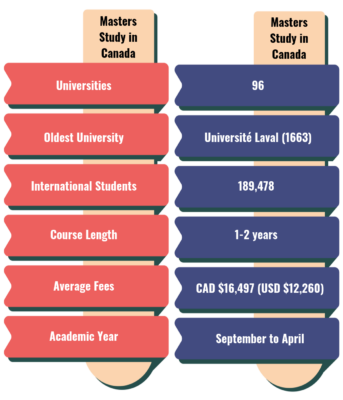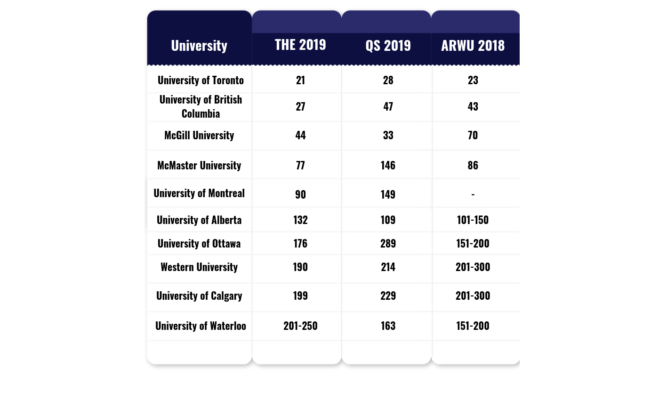
why study in canada
Home to nearly 190,000 international students, Canada is a major global player in higher education. Its popularity with overseas students comes as no surprise – famously tolerant and with several genuinely world-class universities, Canada makes a lot of sense for postgraduates seeking an outstanding country in which to study a Masters.
Here are some of the best reasons to think about a Masters in Canada this year:
- International outlook – Over 200 nationalities are represented by the student body in Canada, and Canadian society is one of the most diverse in the world.
- Investment in education – Tertiary education in Canada enjoys high levels of government spending, putting it near the top of OECD countries in terms of state backing for higher education.
- Bilingualism – With two official languages (English and French) and a multicultural population, Canada offers the chance to learn a new language or to improve your existing skills.
- Post-Masters opportunities – If you’re keen to stay in Canada after finishing your studies, you might be eligible for a post-graduation work permit, allowing you to work in the country for the same duration as your programme.
- Quality of life – The standard of living in Canada is extremely high, and the nation as a whole is a safe and stable environment in which to study.
| Masters Study in Canada – Key Details | |
|---|---|
| Universities | 96 |
| Oldest University | Université Laval (1663) |
| International Students | 189,478 |
| Course Length | 1-2 years |
| Average Fees | CAD $16,497 (USD $12,260) |
| Academic Year | September to April |

process for acquiring Canada student visa (Masters degree)
To study a Masters in Canada, you’ll need to get a study permit. This will serve as your student visa and allow you to live and study in Canada for the duration of your course. You can apply for a Canadian study permit online, or through a visa application centre at a Canadian embassy in your own country.
Before applying for a study permit, you’ll need a firm offer from a Canadian university (as shown by your letter of acceptance on a Masters programme). You must also have no criminal record and be able to demonstrate that you’re in good health.
You’ll also need to provide proof of financial support, such as bank statements and scholarship award letters, to show that you can afford your tuition fees, living expenses and a return ticket to your home country.
Top ranking Canada universities for higher education
Canada has a world-class reputation for higher education, and this is reflected by the performance of its institutions in the three main global ranking tables. Six Canadian universities feature among the top 150 in the world, according to the Times Higher Education World University Rankings.
For more information, read our guide to Canadian postgraduate rankings.
| University | THE 2019 | QS 2019 | ARWU 2018 |
|---|---|---|---|
| University of Toronto | 21 | 28 | 23 |
| University of British Columbia | 27 | 47 | 43 |
| McGill University | =44 | 33 | 70 |
| McMaster University | 77 | 146 | 86 |
| University of Montreal | =90 | =149 | – |
| University of Alberta | =132 | 109 | 101-150 |
| University of Ottawa | =176 | =289 | 151-200 |
| Western University | =190 | =214 | 201-300 |
| University of Calgary | =199 | 229 | 151-200 |
| University of Waterloo | 201-250 | =163 | 151-200 |

